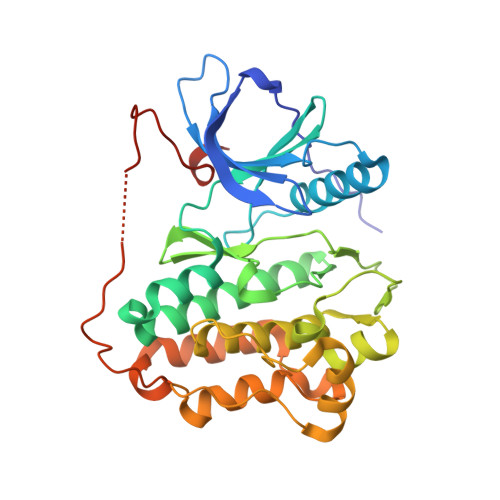Discovery of mobocertinib, a potent, oral inhibitor of EGFR exon 20 insertion mutations in non-small cell lung cancer.
Huang, W.S., Li, F., Gong, Y., Zhang, Y., Youngsaye, W., Xu, Y., Zhu, X., Greenfield, M.T., Kohlmann, A., Taslimi, P.M., Toms, A., Zech, S.G., Zhou, T., Das, B., Jang, H.G., Tugnait, M., Ye, Y.E., Gonzalvez, F., Baker, T.E., Nadworny, S., Ning, Y., Wardwell, S.D., Zhang, S., Gould, A.E., Hu, Y., Lane, W., Skene, R.J., Zou, H., Clackson, T., Narasimhan, N.I., Rivera, V.M., Dalgarno, D.C., Shakespeare, W.C.(2022) Bioorg Med Chem Lett 80: 129084-129084
- PubMed: 36423823
- DOI: https://doi.org/10.1016/j.bmcl.2022.129084
- Primary Citation of Related Structures:
7T4I, 7T4J - PubMed Abstract:
In the treatment of non-small cell lung cancer (NSCLC), patients harboring exon 20 insertion mutations in the epidermal growth factor receptor (EGFR) gene (EGFR) have few effective therapies because this subset of mutants is generally resistant to most currently approved EGFR inhibitors. This report describes the structure-guided design of a novel series of potent, irreversible inhibitors of EGFR exon 20 insertion mutations, including the V769_D770insASV and D770_N771insSVD mutants. Extensive structure-activity relationship (SAR) studies led to the discovery of mobocertinib (compound 21c), which inhibited growth of Ba/F3 cells expressing the ASV insertion with a half-maximal inhibitory concentration of 11 nM and with selectivity over wild-type EGFR. Daily oral administration of mobocertinib induced tumor regression in a Ba/F3 ASV xenograft mouse model at well-tolerated doses. Mobocertinib was approved in September 2021 for the treatment of adult patients with advanced NSCLC with EGFR exon 20 insertion mutations with progression on or after platinum-based chemotherapy.
Organizational Affiliation:
ARIAD Pharmaceuticals, Inc., a wholly owned subsidiary of Takeda Pharmaceutical Company Limited, 26 Landsdowne Street, Cambridge, MA 02139, United States. Electronic address: [email protected].















